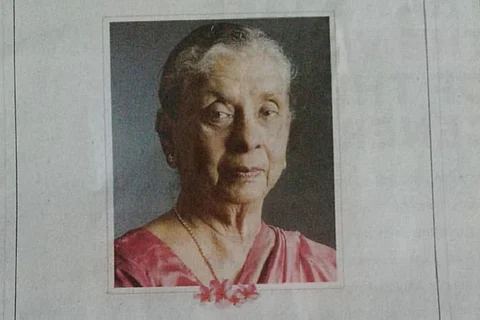

Grace was then about 11 years old. She could just about remember her big sister doing something incredible, something women in those days never did. Anna Rajam George had just joined the Indian Administrative Service and had become the first woman to do so. The year was 1951.
Today, Grace has just landed in India from the US. Her sister – now Anna Rajam Malhotra - who made history, passed away five days ago. Anna didn’t want to be put in a coffin, she wanted to be cremated and the ashes floated ‘in a good place’. Sujith Damodar, who looked after her, fulfilled her last wish, and floated the ashes in Rameswaram.
Sujith is Assistant Manager, Material Receiving at the Leela group in Mumbai. Krishnan Nair, the founder of the Leela group, had been very fond of the late Anna Rajam and made sure she was taken care of properly. “I have been looking after her for the last 15 years. She stayed at a flat near the hotel and every day she would lunch with Mrs Leela Nair, Krishnan sir’s wife. After his death, his children Dinesh, Vivek and Dinesh’s wife Madhu looked after Annama (that’s how I called her)," he says.
Anna Rajam Malhotra with Sujith Damodar
Every year in January and February, Grace would come from the US and the two sisters would go to stay at a villa in Kochi. “I am 12 years younger than her. She was a hard act to follow. She was the top of her class forever,” Grace says now, with distinct memories of the milestones her sister had achieved, never learning to submit to the ‘No’s she heard in life.
She heard it when she qualified for the civil service and appeared for the interview, preferring to join the IAS. It was not considered suitable for women back then. But Anna didn’t back down. “It was a sensation then. She went through the training process which included military training. She had to learn how to ride, to shoot, she had to do everything that men had to,” Grace says.
There was resistance again when she had to be posted to a district. “They were hesitant because she was a woman and they questioned how she would handle law and order as a woman. At that time, Rajagopalachari, former governor general of India, was chief minister (of Madras). He interviewed her and he told her that he didn’t approve of women being in public service. But she argued with him. You should give me a chance, she said. And he was persuaded to post her to Hosur, which was on the border of the then Madras and Mysore states,” Grace remembers.
There was no electricity in Hosur at that time. It’s Anna who persuaded the Madras government to give the people electricity. She had foreseen a problem, Grace says. Hosur was on the border and there was a lot of Mysorian culture and influence. If the people should feel part of the Madras state, the government should take care of their needs.
Another time, Grace remembers, Anna went out to catch a team of smugglers. “She just took a driver and someone else with her. A young woman going out to stop a team of smugglers. She caught them but her boss was upset. It was not wise, she could have been hurt. So then she was given a revolver to protect herself!”
The story of her dealing with a case of six elephants entering a village in Hosur and how she solved it without having to shoot the animals is also famous. Then of course there came the building of the Nhava Seva port in Mumbai that impressed Prime Minister Rajiv Gandhi so much and won Anna the Padma Bhushan in 1989. Anna had also gone on an eight-state tour with his mother and former PM, Indira Gandhi, in her capacity as an agricultural secretary.
Anna Rajam Malhotra receives Padma Bhushan in 1989
But Anna never worked in Kerala where she hailed from. She was born in Ernakulam but the family moved to Kozhikode and that’s where she grew up with her four siblings – they were three boys and two girls. “She was this down to earth, no ceremony, no fancy person, who always batted for the underdog," says Grace.
Grace remembers a recent incident from two years ago. It was one of those times she had come down and the sisters were spending time in Kochi. There was a woman who used to come to sweep and clean the villa and Anna got talking with her. “My sister learnt that the woman had a BSc in Mathematics and she had appeared for the UPSC exam. Her name was also on the list but she never got a call. So every morning Anna would call the officials, the deputy secretary and the joint secretary and ask about the woman. This was in 2016 and suddenly elections were declared. She was disappointed she couldn’t do anything for the woman. But in June, when she had got back to Mumbai, she got a call from the woman who finally got the job.”
Anna with her husband Malhotra
Anna fought conventions all through her life, except when it came to her own life. She had fallen in love with her batch mate RN Malhotra but the two of them decided to wait. He was a Hindu from Punjab, she a Christian from Kerala. They thought of the ramifications their union would bring to the family and kept their love tucked away for 25 years before getting married.